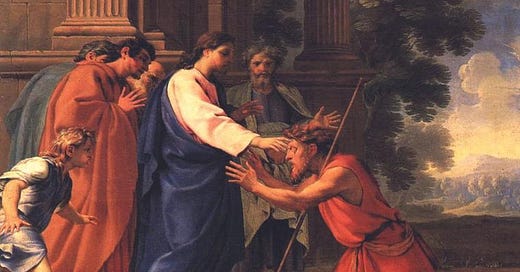who forgives all your iniquity,
who heals all your diseases,
who redeems your life from the pit,
Psalm 103:3-4a
This is part of an occasional series of meditations on Psalm 103.
Forgiving. Healing. Redeeming. These are central actions of Jesus compressed into two verses from Psalm 103.
His offering of forgiveness for our sins came with a sting in the tail: we had to forgive as well. That’s hard. I’m not sure I always manage it down deep in my heart, where the real forgiveness needs to take place. I may tell myself I’ve forgiven those who did evil to me, but I know that somewhere behind my words, I keep open the wounds they made.
We know this is wrong, but it’s hard to root out, particularly when feuds are threaded through the whole fabric of your life. There’s even a name for it: Irish Alzheimers, in which you forget everything but the grudges.
But here is God, offering this threefold gift to people who have wronged Him more than anyone has ever wronged us. And long after He first offered this gift through the Psalmist, we responded by torturing Him to death when He came to offer it, and so much more, in person.
The Gift of Healing
Why did Jesus heal? And why did he heal some kinds of infirmity over and over again? We find them often in the Gospels: blindness, deafness, muteness, lameness of legs and arms, leprosy, demonic possession. Each speaks to a particular aspect of living and proclaiming the gospel life.
Our eyes allow us to see the light. Our ears allow us to hear the word. Our tongues allow us to proclaim the gospel. Our soundness of limb allows us to travel the world and be the hands and feet of the body of Christ. Our cleanness of flesh allows us to be drawn into the community of man. Our freedom from demons breaks the shackles of Satan that tie us to sin.
None of this means that any of these trials exclude one from the kingdom. There are blind preachers and leprous saints. Rather, their healing is a foretaste of the kingdom when, on the Day of the Lord, Isaiah promises:
Then the eyes of the blind shall be opened,
and the ears of the deaf unstopped;
then shall the lame man leap like a deer,
and the tongue of the mute sing for joy.(Is 35:5–6)
Not everyone who Jesus touched was healed, and all of those He healed, eventually died. Lazarus died, again. We learn in his own hometown, the people’s faith was so poor that he could work few miracles. Others, then and now, are not healed, because it is the will of God in a way we cannot possibly see. They are, instead, called to be a witness to strength and faith in suffering. I’ve suffered and seen suffering. I’ve seen it destroy hope and make saints, and I know one thing for absolute certain: the dividing line between those two responses is faith. And that’s what we are called to.
Lifting Us Out of the Pit
Finally, he comes to redeem our life from the pit. There is no question of what the pit is. It is Hades. It is Sheol. It is death. That word–redemption–should strike us. He could have merely lifted us from the pit, but the word used–go’el–has varied meanings and deep resonance.
In particular, it speaks to the responsibility to buy something back, like the field bought back in Jeremiah 32:7. It’s the satisfaction of debt by kin, which tell us two things. First, God considers us kin, initially through covenant, and then through baptism. Second, there is a price to be paid, and that price is so high that no payment, no ritual, no act, no sacrifice will suffice other than one only God can pay, and that is God Himself.
In the economy of salvation, grace is the coin of the realm, and God has established its value: Himself. We can’t earn it, but through His free gift and through the sacraments, He provides a way for us to receive it. He set aside His glory, and reached down to draw us out of the darkness by joining us there, and defeating it. His self-sacrifice redeems us from the pit, but there is still further for us to go, as we will see in the next three verses.
Prayer
Lord, you forgave us, healed us, and redeemed us, may we in turn be part of forgiving others, healing the wounds of the world, and proclaiming your message of salvation.
Meditation
Do we fail to forgive fully and unconditionally? Do we cause wounds that others need to heal? Does our example draw others closer to Christ, or push them further away.




